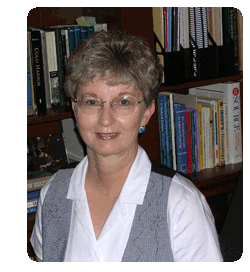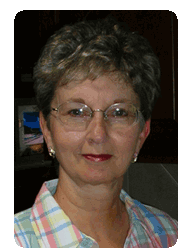Meet Sharon

Taking the Mystery out of Family History
Sharon Moody is a genealogist, which means she spends her days researching family ties and history. Find out why she believes that the most interesting people you can discover are in your own family tree.
Describe your job. What’s your day like as a genealogist?
One of the things I like most about genealogy is that no two days are alike. Depending on the day and the project, my activities range from working on the Internet to conducting interviews by telephone or in person. I also spend a lot of time researching records at the courthouse, reviewing microfilm at a library, or visiting the Family History Center where I go through archives, and read or research.
Before becoming a genealogist, you had careers as a reporter and a police officer. What made you want to change careers? What was the path from your first career to your work now?
I grew up wanting to be a reporter. It was all I ever dreamed of doing. And when the dream came true, it wasn’t at all what I thought it would be. I worked as a reporter for two years, covering [police stories] for a newspaper. One of my duties was to check in daily with the Director of Public Safety [in the community]. During one of our chats he asked if I’d ever thought about becoming a police officer. I had not, but it began to intrigue me, so I said, “I’ll try anything once,” and joined the force.
When the time to retire from law enforcement came, I was still relatively young. I saw a feature on television about individuals taking their hobbies and turning them into new careers. For years, I had been an amateur genealogist – it seemed natural to become a professional. The skills of investigating, seeking evidence and proving theories, writing reports and teaching in the police academy all serve me well today as I research ancestry, lecture, and write about it.
Can you describe step by step how you go about determining someone’s family history?
It would take lots of time and space, but I can tell you how to get started. An important part is that you work backward through each generation (hint: start with you and your parents.) Record your parents, grandparents, and backward as far as you remember or know.
Then, interview living relatives to get information they remember that you don’t already know. As each piece of information is gathered, record the source and make sure it’s accurate.
You shouldn’t just take someone’s word. For instance, if someone tells you when a person was born and when he died, you should seek proof of that through birth and death records (many are available online or at your local city or town hall, or library).
The field of genealogy is changing and there are a lot of younger people, especially women, entering the field. Why do you think genealogy appeals to young women today?
Historically, many women were hidden behind the men in their lives—their fathers and then their husbands—and little was recorded or known about them.
Now, society allows girls and women to have a sense of themselves and individuality, so a natural next step is to wonder, “What were the people like who came before me?” Perhaps things are known about the men in their family tree but little is known about the women. That curiosity drives young women to dig and seek information.
You are a part of a worldwide network of genealogists. Do you contact your colleagues when you need help? How do you use this network as a support system?
One thing about genealogists is that they seem always ready to help others. We love the challenge of the search and the thrill of the discovery – no matter whose ancestors we are seeking. Sometimes, we need help getting a hold of a record from a courthouse 500 miles away and [rely on our colleagues to help]. I’m not sure genealogy would survive without the networking. It’s nice to have people to turn to when you need help with a project.
Describe a few of the most memorable cases you’ve worked on.
Something very important to remember in genealogy is that most people descend from ordinary folks – it is not likely that you’re going to find royal or famous blood. Keeping this in mind, some things will be memorable to you when they don’t mean anything to rest of the world.
One of my second great-grandfathers was about 22 years old when the Civil War began. He was the son of a Southern farmer who did not own slaves. He joined the army and fought in numerous battles for four years, but just two weeks before the war ended, he was shot in a battle in North Carolina. He suffered for the rest of his life because of his war injury. This fascinated me.
 I spent a lot of time studying the battles in which he fought and two years ago my husband and I went to Virginia and visited each of the places where he fought. It was awesome to stand on battlefields in the exact places where his military unit fought, proven by documentation!
I spent a lot of time studying the battles in which he fought and two years ago my husband and I went to Virginia and visited each of the places where he fought. It was awesome to stand on battlefields in the exact places where his military unit fought, proven by documentation!
What advice do you have for girls who are interested in careers that require lots of investigation and research? How can they start building those skills now?
Stay focused and don’t get sidetracked by people who tell you that you can’t have a certain career or go a certain route. I strongly believe that girls and women can do anything they set their minds to.
I believe that you are more likely to succeed if you get a good education. It is important to understand the world around you before you can ask intelligent questions and logically question things you encounter. Education will give you the tools to challenge things you find.
Have you ever traveled anywhere to find out more about a person or a family’s history? If so, where did you go?
Contrary to what so many people think, you cannot do your family genealogy solely on the internet. It is important to get out and travel to the locations where families lived. If your ancestors came from New Jersey, go to New Jersey, research in the courthouses there, and find the original land, birth, death, and other records they created. Once you’ve proven where they lived, go out and visit the neighborhoods, walk the land, see their houses. Sometimes the houses aren’t there, but at least you can find the land on which the house at one time stood.
All the lines of my family came through Virginia and into the southeast, so I’ve visited the areas where they’ve lived –Virginia, the Carolinas, Georgia, and Alabama. Those also are the areas in which I do research for other people.
In doing research you must come across stories of amazing women. Who has been the most inspiring to you?
Actually, women in general are inspiring. Stop and think about women who lived prior to the 20th century had no real identity because men ruled the world and women did what they were told. Most women had no choice except to marry and raise families, which meant having a child about every two years! Don’t be surprised when you find your family in the 1800’s and see that most families had 12 or 13 children.
People once didn’t have the conveniences we have today – can you imagine having to wash and iron and cook and sew for a family with that many children? Today we have so many privileges and opportunities that they did not have. All of our grandmothers and great-grandmothers must have been pretty amazing!
What do you do for fun?
While I practice genealogy professionally for other people, I also enjoy researching for myself just for fun. I like to travel with my husband to investigate historic places and learn more about the past.

 Tara is making a difference one step at a time as the Program Director of the Lower East Side Ecology Center. Meet Tara
Tara is making a difference one step at a time as the Program Director of the Lower East Side Ecology Center. Meet Tara  Stephanie is a professional blogger whose focus is body image. Meet Stephanie
Stephanie is a professional blogger whose focus is body image. Meet Stephanie  Laura gets to give away money to charities for a living as President of a corporate foundation. Meet Laura
Laura gets to give away money to charities for a living as President of a corporate foundation. Meet Laura